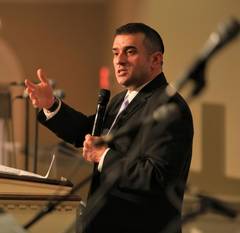- About Us
- Learning
- Resources
- Get Involved
- Membership
- Jobs
Loyalty, Solidarity & Love in the Face of Fear
12/18/2019 01:31:12 PM
Rabbi Brent Spodek
| Author | |
| Date Added | |
| Automatically create summary | |
| Summary |
 This has been an extraordinarily difficult month for the Jewish community in America.
This has been an extraordinarily difficult month for the Jewish community in America.
We watched in anguish as the news unfolded of an antisemitic act of terror in a kosher market in Jersey City, committed by a radicalized member of the Black Hebrew Israelites. Six people died in the third mass attack on Jews in America in just over a year, which occur amidst a rising number of attacks on Jews and Jewish institutions in Brooklyn and around the country.
Just days before, the President of the United States reiterated dangerous antisemitic tropes about Jews who are disloyal and “don’t love Israel enough.” Trump spoke to rousing applause before the Sheldon Adelson-funded Israeli American Council (IAC), saying: “A lot of you are in the real estate business… You’re brutal killers, not nice people at all. But you have to vote for me—you have no choice...You’re not gonna vote for the wealth tax. Yeah, let’s take 100% of your wealth away!...” Language like this is fuel for White Nationalist terrorists, who are enjoying an unprecedented surge of interest these days.
Over this past shabbat, the Nessah Synagogue, a spiritual home in Beverly Hills for many Persian Jews, was vandalized and desecrated. In this attack, Torah scrolls, which our tradition rekons as if they were living beings, were torn up and sprawled across the floor. In light of this attack, Rabbi Yedidia Shofet, from Nessah Synagogue, called for a rededication to Ahavat Yisrael, a commitment to come together to show love and support for our people in this vulnerable time. It is a deeply Jewish act to respond to hatred not with more hatred, but with a redoubled force of love for our hurting family.
In many ways, Rabbi Shofet is following the model of Rabbi Kalonymus Shapira, the Hasidic rebbe of the Warsaw Ghetto, known as the Eish Kodesh. During the fall of 1939, the Germans bombarded Warsaw, and most of Rabbi Shapira’s family was killed. The Warsaw ghetto was essentially built around his home and his unhappy fate was to shepherd his community through hell, to their death. He did this with a love and compassion and moral courage which humbles me.
At the very end of his life, Rabbi Shapira was held in a factory with other communal leaders - political activists, lawyers, artists, scholars. Somehow, Jewish guerilla fighters infiltrated the factory and prepared to smuggle the prisoners out in groups of two or three.
These leaders had made a pact that none would leave without the others. In The Holy Fire, Professor Nechemia Polen writes that despite the emphasis that Judaism places on saving life, “these were no ordinary times; the Nazis had done their best to destroy not only the physical lives of the Jews, but their souls. The enemy had divided Jew against Jew, holding out the vain hope of survival to some, as he took others to their deaths.
In the summer of 1943, when most of Polish Jewry had already been murdered, it might well have seemed to the communal leaders of Jewish Warsaw that the most important statement they could make at that moment was an expression of mutual solidarity.
“Escape -- even if successful -- would likely bring only temporary reprieve from death; more important, more lasting, more meaningful was to express solidarity with brothers and sisters, the unbowed remnant of a once proud and flourishing Jewish community.
“For Rabbi Shapira personally, this solidarity pact would have taken on a dimension of special religious meaning, that of Kiddush ha-Shem, holy martyrdom. The pious hasidic master joined hands with nominally secular figures: political activists, lawyers, intellectuals, artists, and others, sweeping aside all ideological differences in an act of solidarity that reached the core of their shared Jewish identity.
“For Rabbi Shapira this was no doubt the highest expression of love of God, and love of God's persecuted children. To turn down a rescue attempt in such circumstances was a compelling act of faith, a concrete articulation of the soul-to-soul bonding that he had preached all his life.”
At the very end, Rabbi Shapira resisted, not with force, but with loyalty, solidarity and love.
From the depths of hell, Rabbi Shapira reaches out to teach those of us on the precipice that we don’t have to let the bigots determine the terms of the fight. Our honor comes not from how others treat us, but from how we act.
We learn in the old words of the Mishna, וּבְמָקוֹם שֶׁאֵין אֲנָשִׁים, הִשְׁתַּדֵּל לִהְיוֹת אִישׁ - In a place where nobody merits the name human, where decency has been trampled, we work, we strain, we struggle to be a human. We stand in solidarity, we act with honor, we live by the values we hold dear – no matter the cost.
At this time, when we feel an increased sense of fear and unease, it’s critical that we not isolate ourselves from the rest of humanity. Hatred thrives in times of polarization and destabilization, so particularly now, when so many of us feel increasingly vulnerable, we must deepen our multi faith relationships and continue to show up for one another with love. Now, more than ever, our relationships matter.
May our loving relationships carry us forward, together, toward brighter days.
Sat, October 18 2025
26 Tishrei 5786
RABBI BRENT SPODEK

Join Our Mailing List
Privacy Settings | Privacy Policy | Member Terms
©2025 All rights reserved. Find out more about ShulCloud


